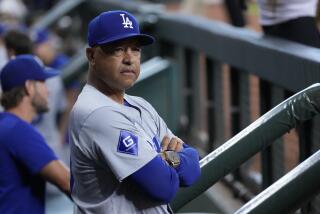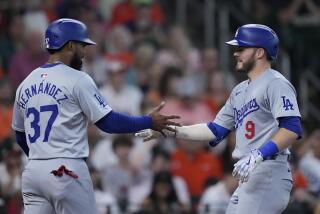It’s looking like a big off-season for free agents
How much is the best player in baseball history worth?
We may soon find out if Albert Pujols follows through on his threat to test the free-agent market this winter.
The St. Louis Cardinals slugger probably won’t be the only big-name player available. Milwaukee first baseman Prince Fielder, New York Mets shortstop Jose Reyes, Chicago Cubs third baseman Aramis Ramirez, New York Yankees left-hander CC Sabathia, Texas ace C.J. Wilson and San Diego closer Heath Bell may also be looking for riches in a tough economy.
Don’t bet against them getting it. Despite the stubborn recession — which has battered even recession-proof baseball — a number of factors could conspire to make this an unusually lucrative off-season for the most prominent free agents.
Here’s why the market could get pricey:
First of all, there’s precedent: Though it’s unlikely Pujols will get a contract matching either the length or value of the 10-year $275-million deal the Yankees gave Alex Rodriguez three seasons ago, New York recently signed Mark Teixeira and Sabathia to contracts of at least seven years and more than $22 million a season. And don’t forget the $126 million over seven years the Washington Nationals gave slumping outfielder Jayson Werth.
Good or bad, those deals set the floor for negotiations this winter — and if Sabathia decides to opt out of his deal and seek even more money, that floor could rise considerably.
Then there’s the competition.
The free-agent market has generally been a high-stakes poker game between Yankees and Boston Red Sox, which would appear to hurt Pujols and Fielder, who will probably be the two most sought-after position players this winter. Boston and New York already have productive and expensive first baseman, so they aren’t likely to enter the bidding for another one.
But the penny-pinching Florida Marlins may. No, seriously.
Owner Jeffrey Loria has long promised he would loosen the purse strings once the team had a stadium deal, and Miami’s new ballpark is scheduled to open in the spring. Florida has already been linked to rumors involving Pujols and Fielder — which should help their market value — though the Marlins are more likely to settle for Ramirez or Reyes. The Marlins’ incumbent shortstop, Hanley Ramirez, has already said he would move to third base if the team lands Reyes.
Here’s what the owners should be hoping for this winter:
Although Pujols is likely to finish this season with an average above .300 and more than 30 homers and 100 runs batted for the 11th time in his 11-year career — something no player has ever done — he’ll be 32 next season. So expect to hear a lot about the cautionary tale of Alex Rodriguez.
After signing his record deal with the Yankees at 32, Rodriguez first became embroiled in a steroid controversy, then his production dropped off dramatically. This season, he has missed more than a third of his team’s games because of injuries, yet the Yankees will be paying him an average of $24 million annually over the next six years.
As a result, Pujols may find himself looking at offers that aren’t significantly different from the one the Cardinals reportedly made last spring: nine years and around $200 million. If that happens, Pujols may decide to stay put. He’s already a hero in St. Louis, where he runs a charity and owns a restaurant, and finishing his career there would further cement his legacy.
Leaving for an extra year or a few more dollars, on the other hand, would make him look like a mercenary. (Think that’s not important? Just look at how fans view Derek Jeter compared to Rodriguez.)
With Pujols out of the picture, the bidding for what’s left could drop. Yes, Fielder is a great hitter, one who has averaged more than 37 homers and 106 RBIs in six seasons — numbers that compare favorably to Teixeira’s first six years. Plus, he’s four years younger than Pujols and he has an agent, Scott Boras, who has proven he can control the market. (Guess who Werth’s agent is?)
Expect many owners to cry poor. Paid attendance is up over last year, though by less than 100 a game. Sponsorship dollars have also become more difficult to find.
All this changes, of course, with one ludicrous contract. Carl Crawford should probably thank Werth for the seven-year, $142-million contract he signed with Boston five days after the Nationals landed Werth. If Sabathia, 31 and averaging 19 wins a season the last five years, opts to be a free agent he could become a game-changer as well.
This much we know for sure: Some players are going to become ridiculously rich, some owners are going to offer ridiculous contracts, and fans in most cities are going to wonder why their team let the big one get away.
Stay tuned. The free-agent market opens for business 15 days after the World Series ends.
More to Read
Go beyond the scoreboard
Get the latest on L.A.'s teams in the daily Sports Report newsletter.
You may occasionally receive promotional content from the Los Angeles Times.











